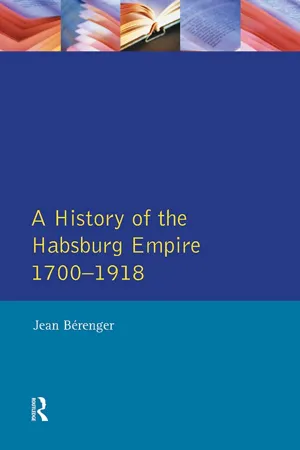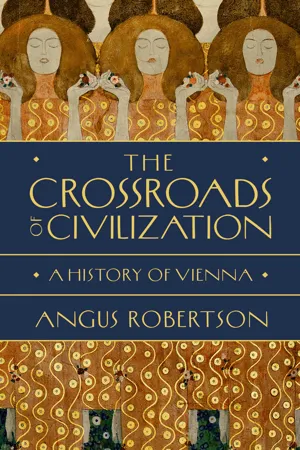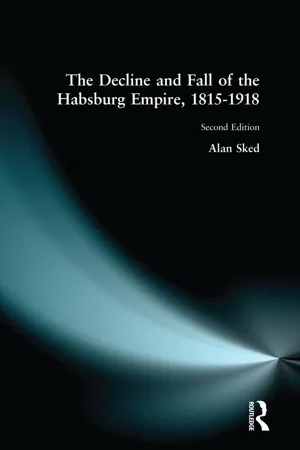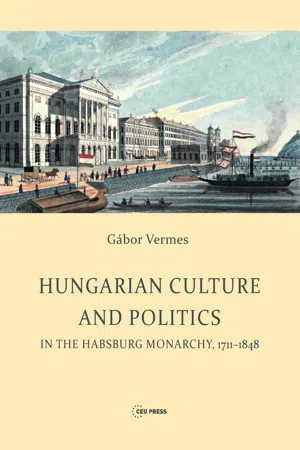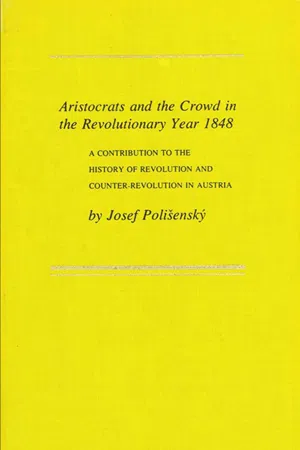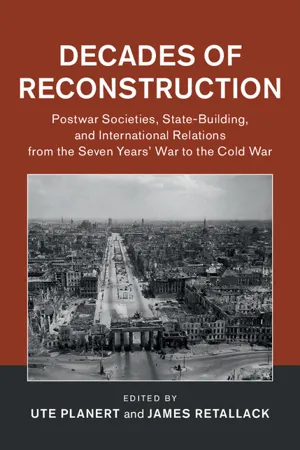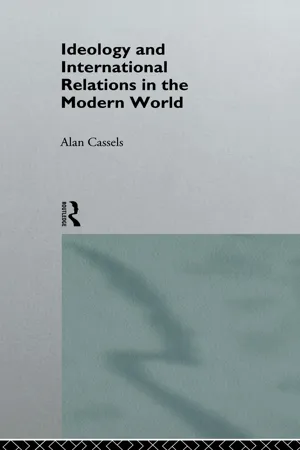History
Age of Metternich
The Age of Metternich refers to the period in European history from 1815 to 1848, characterized by the dominance of conservative political forces and the influence of Austrian statesman Klemens von Metternich. It was a time of restoration and reaction following the Napoleonic Wars, marked by efforts to maintain the status quo and suppress liberal and nationalist movements across Europe.
Written by Perlego with AI-assistance
Related key terms
1 of 5
8 Key excerpts on "Age of Metternich"
- eBook - ePub
- Jean Berenger, C.A. Simpson(Authors)
- 2014(Publication Date)
- Routledge(Publisher)
CHAPTER TEN The Age of Metternich (1815–48)The period from 1815 to 1848 was dominated by the character of the chancellor of Austria, and in Austrian historiography is referred to as the Age of Metternich. Klemens Wenzel Nepomuk Lothar, count, later prince, Metternich was the true successor to Kaunitz, whose granddaughter he took as his first wife. In 1809, after his recall from the embassy in Paris, he was in charge of foreign affairs and from 1817 was the emperor Francis I’s chief minister. After Francis I’s death in 1835 and until the revolution of 1848, he was the true ruler of Austria since, with count Kollowrath, he controlled the Regency Council which until 1848 assisted Ferdinand I ‘the Benign’ (1793–1875) who had succeeded Francis I as emperor but was incapable of managing affairs on his own, even with the assistance of a prime minister.Metternich belonged to a family of aristocrats which had always served the House of Austria, as canons in the cathedral chapters of the Rhineland or in the diplomatic service and army; since 1648 there had been a Metternich heavy cavalry regiment. The chancellor loved society, especially that of beautiful women. He was intelligent and lively, not especially inclined to hard work, and found administration boring in the extreme. He left a copious private correspondence which reveals his intellectual qualities as well as his limitations and obsessions.METTERNICH AND EUROPE: THE HOLY ALLIANCE
Metternich devoted all his effort to maintaining the system put in place in 1815 and to countering the ideas of the French Revolution. He remained unshaken in his resolve and did not cease to parade his self-confidence before the emperor, despite the fleeting differences of opinion between them over the modernization of institutions.In 1832 he wrote to count Apponyi, ‘in Europe, there is only one matter of import and that is revolution’. He had a mission to join Prussia and Russia in guaranteeing the order restored by the treaties of 1815. This was one of the reasons he imposed Austrian preponderance in Germany and Italy and distanced himself as far as possible from any ventures in the Balkans. It is also the reason he used every means at his disposal to render permanent the Europe of ruling elites and princes which he had created. He agreed to join the Holy Alliance although, as a confirmed rationalist, he had serious reservations about tsar Alexander I’s mysticism. The Congress system was based on frequent diplomatic congresses which brought together the great powers, Austria, Russia, Prussia, Great Britain and, after 1818, France. On three occasions, at Troppau in December 1820, at Ljubljana in January 1821 and Verona in summer 1822, the powers, despite British reservations, followed the course advocated by tsar Alexander. In the name of European order, Spain was restored to Ferdinand VII through French military action and Austria received the mandate to intervene with arms against the liberal regime in Naples and, at the request of the king of Piedmont-Sardinia, crushed the liberal uprising in Piedmont in April 1821, and so safeguarded Austrian preponderance in Italy. The prospect of Greek independence raised fears that the status quo in the Balkans would be overturned, with potentially serious consequences for Austria since there was the risk that Russia would gain the advantage. True to his beliefs, Metternich refused to intervene in support of the Greek insurgents. He saw no need for an independent Greek state. The intervention of France, Britain and then tsar Nicholas I caused him serious disquiet. The long crisis from 1821 to 1832 was finally resolved by a compromise, the Treaty of Adrianople (1829), which was instigated by British diplomacy. Greece became autonomous and in 1832 independent. Russia gained some advantages, in particular the autonomy of the principalities of Moldavia and Wallachia, but the principle of the integrity of the Ottoman empire was maintained and the Russian thrust into the Balkans was contained. - eBook - ePub
The Crossroads of Civilization
A History of Vienna
- Angus Robertson(Author)
- 2022(Publication Date)
- Pegasus Books(Publisher)
The Concert of Europe: The Age of Metternich‘The events which can not be prevented, must be directed.’ – Klemens von MetternichFrom the end of the Congress of Vienna in 1815 until the revolutions that rocked the continent in 1848, the figure of Klemens von Metternich plays an oversized role in both domestic Austrian and international European affairs. Relations between states were said to operate as part of the Metternich System (the Concert of Europe), while the era of his rule in Austria as chancellor has been dubbed the ‘Age of Metternich’.1 The importance of Austria and Metternich was acknowledged even by its sternest critics: ‘Austria is no doubt, indebted to Metternich and his stratagems for its aggrandisement and its geographical arrondissement. Venice, Milan, and, above all, the Tyrol, Salzburg, and the territory which he prevailed on Bavaria in the most specious terms, to return, are important acquisitions. This empire constitutes now a compact body of kingdoms and provinces, with more than 30 million inhabitants, and a considerable sea-coast; – a monarchy which, if its interests were properly understood and managed might prove a match against the most powerful on the continent of Europe.’2Immediately following the congress, the focus for Metternich remained international affairs and his role in them as mediator. ‘It is impossible to converse with Prince Metternich and not see that his great ambition is to place himself at the head of politics of the Continent,’ is how he was characterised by the British ambassador to Vienna Henry Wellesley, First Lord Cowley. ‘He considers himself, and wishes to be considered by others, as the champion of old systems, and the great opposer of innovation throughout Europe. He prides himself upon his dexterity in having got complete possession of the Emperor of Russia and the King of Prussia; and the Ministers of those Sovereigns, as well as the French Ambassador at this Court, are devoted to his politics, and to him personally.’3 - Alan Sked(Author)
- 2015(Publication Date)
- Routledge(Publisher)
1 Metternich and his System, 1815–48 T HE MOST prominent figure in nineteenth-century Habsburg history was, of course, Prince Metternich, Foreign Minister between 1809 and 1848 and House, Court and State Chancellor from 1821. Historians occasionally refer to the period 1815–48 as the ‘Age of Metternich’ and often it is said to have been dominated by ‘the Metternich System’. The implication is that Metternich not only formulated the foreign policy of the Habsburg Monarchy, but through that controlled the destiny of Europe. For this reason he is considered a major historical figure and like all such figures is surrounded by controversy. Judgements of him, however, have on the whole been negative. Most textbook writers see him as a reactionary figure whose obsession with suppressing revolution — the Revolution, with a capital R from his point of view — frustrated the establishment of moderate, constructive, reforming regimes in Central Europe. Had it not been for the Metternich System, these writers imply, Europe as a whole might have developed along general liberal lines and perhaps have been spared all sorts of wars and catastrophies. In particular, the Deutscher Sonderweg, that is to say, Germany’s peculiar path of historical development, might never have occurred, Bismarck might never have been necessary, and European history might have taken on an altogether different character. Likewise, if it had not been for Metternich, the Habsburg Empire might have reformed itself constructively, the nationalities might have been appeased, and 1914 might never have happened- Gábor Vermes(Author)
- 2014(Publication Date)
- Central European University Press(Publisher)
52 Metternich, a statesman whose essential ideas had been formed in the late eighteenth century, was dead set against the momentum that the Zeitgeist, as shaped by both liberalism and nationalism, repre-sented. For him, major and substantial reforms signified steps that would inexorably lead to anarchy. Expressing his fear in a memoran-dum at the end of 1844, he thought that a revolution was about to break out in Hungary. Yet, he was also a cunning tactician who had made con-cessions to the 1843–44 diet on various reform proposals, primarily to delay or optimally to prevent such a revolution from taking place. To a degree, he also acted in the spirit of moderate reform, because, ever since Maria Theresa, the Habsburgs had not wanted to allow Hungary to sink below a level that would have kept the country lopsidedly back-51 Kann, A History of the Habsburg Empire , 283; December 1, 1843, Iratok , 554. 52 Bernhard Giesen, Intellectuals and the Nation: Collective identity in a German Axial Age (Cambridge, 1998; originally published in German in 1993), 94; quot-ed in John Hutchinson and Anthony D. Smith (eds.), Nationalism (Oxford, 1994), 25. 311 ward, as compared with the monarchy’s more prosperous parts. It was a balancing act, certainly by the nineteenth century, which involved the idea of saving what could be saved of the old system and reforming only when no other alternatives remained or when the paramount interests of the Monarchy did demand some alterations. In this respect, Metternich’s knowledge of Hungary was superficial, mirroring the cus-tomary Austrian attitude best described as “a general reluctance to see any Hungarian point of view.” 53 The liberals were angry about the indifference which, they believed, Vienna had manifested about the Slav danger confronting Hungarians. This anger was often couched in statements that, in retro-spect, appear quite off the mark.- eBook - PDF
Aristocrats and the Crowd in the Revolutionary Year 1848
A Contribution to the History of Revolution and Counter-Revolution
- Josef V. Polisensky, Frederick Snider(Authors)
- 2015(Publication Date)
- SUNY Press(Publisher)
In 1850 he noted that “in Austria the revolution devoured the nobility and democracy both, from whose union it had originated, and it ushered the army, the bureaucracy and the Church into power—the three great buttresses of Monarchy, as long as they are handled properly.’ ’ But Metternich did not take the internal threat very seriously until the Aristocrars and the Crowd in the Revolutionary Year 1848 autumn of 1847. In any case it did not come within the purview of his own department. and. like the modern admirers of his “art of statesmanship, " he was convinced that foreign policy would always be able to justify his grand con ception of a “scale of order. " This was Henry Kissinger's argument in A World Restored, and he discerned Metternich’s greatness as a statesman in his unfail ing ability to find the right balance between his “legitimist” convictions and the requirements of Austria’s situation. Metternich’s principle of “legitimacy” enabled him, together with Castlereagh and Talleyrand, to construct a balance of power in Europe after the fall of the Napoleonic system—a balance in which potentially revolutionary France was neutralized by being thrust into conven tional great-power politics. According to Kissinger, Metternich and his col leagues. conservative statesmen from lands with a “traditional” social structure—Great Britain was the exception, making Castlereagh's position par ticularly difficult—were struggling to implement a counter-revolutionary policy, and they were successful as long as they were able to achieve the “legitimization” of their aims at home and abroad. Since Castlereagh commit ted suicide in 1822 and Talleyrand died in 1838, only Metternich was left to undergo the test of a statesman: he saw the development of a revolutionary situation, and he took some steps against it.’ Kissinger. a profound admirer of Metternich. concluded his book with an ac count of the last intervention, organized against the danger of revolution in Spain in 1823. - eBook - PDF
Decades of Reconstruction
Postwar Societies, State-Building, and International Relations from the Seven Years' War to the Cold War
- Ute Planert, James Retallack(Authors)
- 2017(Publication Date)
- Cambridge University Press(Publisher)
Wilhelm Oncken, Das Zeitalter der Revolution, des Kaiserreiches und der Befreiungskriege, 2 vols. (Berlin, 1884–1886), 2:686–787, remains fundamental for details. Further important syntheses on important aspects of European policy in 1814 are Charles K. Webster, The Foreign Policy of Castlereagh 1812–1822, 2 vols. (London, 1925–1931), 1:193–276; Enno E. Kraehe, Metternich’s German Policy, 2 vols. (Princeton, NJ, 1963–83), 1:281–312; Paul W. Schroeder, The Transformation of European Politics 1763–1848 (Oxford, 1994), 477–509. Since this chapter was drafted in late 2013, several new studies of the Congress and its era have been published in English, among them Brian E. Vick, The Congress of Vienna: Power and Politics after Napoleon (Cambridge, MA, 2014); Maartje Abbenhuis, An Age of Neutrals: Great Power Politics, 1815–1914 (Cambridge, 2014), and, particu- larly important for the topic of this chapter, Mark Jarrett, The Congress of Vienna and Its Legacy: War and Great Power Diplomacy after Napoleon (London, 2014), 158–379. See also Katherine B. Aaslestad, “Serious Work for a New Europe: The Congress of Vienna after Two Hundred Years,” Central European History 48 (2015), 225–237. The Reorganization of Europe in 1815 87 the problem of a possible successor to Napoleon, the question of his dynasty’s legitimacy, and the conflict over the future role of the house of Bourbon. According to Metternich, a change of dynasty in France could not be prescribed by the allies but had to be the result of an act of will on the part of the French nation. 7 This formulation and the contradictions it contained provoked Metternich’s leading counselor in Vienna, Friedrich Gentz, to voice fun- damental, sharp criticism. - eBook - PDF
Paths to a New Europe
From Premodern to Postmodern Times
- Paul Dukes(Author)
- 2017(Publication Date)
- Bloomsbury Academic(Publisher)
For Metternich, as we have seen, the principal aim was to maintain stability everywhere, at home as well as abroad. And although he claimed that for him stability did not mean immo-bility, he set his mind firmly against the kind of change that would have given Austria a better chance of successful adaptation to the pressures exerted by the nineteenth century. He had no time for civil rights and liberties, political parties or parliaments, which for him could only incite unrest, although he did allow them in the southern German states. Finding the principal location of agitation in favour of such constitutional advance in the universities, he made full use of the opportunity presented to him by the assassination of a Russian agent named Kotzebue in 1819. He obliged the German Confedera-tion to accept the so-called Carlsbad Decrees, which instituted close supervision for educational institutions, especially the universities, where idealistic student fraternities known as Burschenschaften were indeed concerning themselves with the question of German unifica-tion, especially according to a liberal pattern, and even some teachers were arguing for such change. Such teachers were now to be dismissed, and the Burschenschaften dissolved. A central investigating commission was set up to seek out revolution and quell disturbances. The decrees stressed the need for a strict censorship of the press, and for the prohibition of political meetings. In 1832, the Carlsbad Decrees were reinforced by the so-called Six Acts. Conscious of his role as senior minister in the German Confedera-tion, Metternich was totally opposed to any federal solution for its political problems. He also believed that the empire could be kept intact only if the imperial authority was imposed on it in a uniform and unitary manner. - Alan Cassels(Author)
- 2002(Publication Date)
- Routledge(Publisher)
Those princes who had been restored in 1815 therefore deserved protection, for ‘monarchy is the only government that suits my way of thinking’. The diplomatic settlement of 1815 was similarly inviolable because international engagements must be honoured ‘so long as they are not abolished or modified by common agreement between the contracting parties’. If popular nationalist feelings, aroused in the French revolutionary era, had been ignored at the Congress of Vienna, that was of no account; they engaged Metternich’s attention only as a facet of democracy, ‘a principle of dissolution, of decomposition’. 14 Nor should it be overlooked that nationalism was a deadly virus for the state in whose service Metternich, a Rhinelander, had risen to prominence; the Habsburg empire was a melange of differing national groups. When German Burschenschaften (student groups) agitated in 1819 against the betrayal of the liberal and nationalist hopes of the war of liberation, Metternich persuaded the diet of the Germanic Confederation to accept the Carlsbad Decrees which imposed political tutelage and censorship on German universities. The next question was whether the Burschenschaften were a local phenomenon or part of a wider discontent. The latter view gained ground in 1820 with the assassination of the king’s nephew in Paris, anti-government conspiracy in London and open revolts in Italy and the Iberian peninsula. ‘We have come to one of those fatal epochs’, wrote Gentz, ‘when one cannot count on anything.’ 15 Legitimacy required upholding on the international stage. The essence of Castlereagh’s 1815 proposal for a European concert was periodic meetings of the great powers, and in the next seven years four international congresses were held. The first, at Aix-la-Chapelle in 1818, dealt with the problems of containing France and reintegrating it into the family of nations, which was, in Castlereagh’s view, the proper and principal object of the concert
Index pages curate the most relevant extracts from our library of academic textbooks. They’ve been created using an in-house natural language model (NLM), each adding context and meaning to key research topics.
